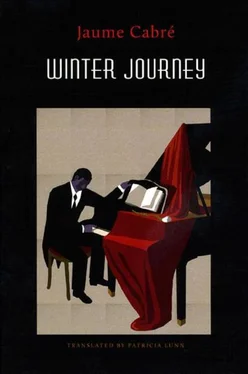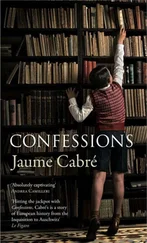This theme and the music derived from it had come back into the old man's memory. That is why he sat up in bed, turned his useless eyes to the wall and murmured Kaspar, my son, Kaspar, don't you hear it?
"1 hear nothing, master."
The boy shuddered. He'd fallen asleep, with the book open. The master had fallen asleep before he got to the end of the seventh chapter. And that treatise on the sounds of nature was so boring that the very memory of the pages he'd read had made him succumb as well.
"Has Gottfried come back?"
Kaspar woke up. He put, at the appropriate page, the piece of yellow leather with the embossed lion that the master always used as a bookmark, closed the book and left it on the bed table, next to the brownish medicine that was left in the glass. His recently awakened mind soon oriented itself.
"He's staying with the Altnikols until…"
"Until 1 die."
"Those were the arrangements you made."
Kaspar, alert, expected the master to react strangely. But he neither got upset nor let his body rest against the pillows. Instead, he flung aside the thin sheet and made as if to climb out of bed. Poor Kaspar, frightened, didn't know what to do.
"But, master… You can't…"
"I certainly can. I'm not dead yet. Where's my walking stick?"
"1 don't know. I don't…" Disconcerted. "Your walking stick? You want your walking stick?"
"No one thought 1 would walk again. Have you thrown it away?"
"1 can be your walking stick, master."
The old man agreed, admiring the quick response of the lad he called son and would have been glad to have as a son. Meanwhile, poor Kaspar was cursing his bad luck. The mistress had to be away until nighttime and they'd told him to respect the master's desires, however trivial.
"Take me to the organ."
Kaspar had to be the master's improvised staff. He could imagine the long faces of the family when they found out what had happened. But he was there to respect the master's wishes, however trivial.
They went through the family dining room and the clavier room to the door that led to the organ chamber.
"The key should be in the lock," the master said. And yes, it was. Breathing with difficulty from the effort, the master leaned against the wall and said to himself, Wall, blessed wall, you surely didn't expect that 1 would lean against you ever again.
"Do you want to go back to bed?" asked Kaspar hopefully.
"Absolutely not."
Once he had recovered from his fatigue, the master made some secret taps on the wall and, on the boy's arm, went into the organ room. As if he were seeing it: not an especially large instrument, with few registers, but mechanically very solid and dependable and amazingly pitch-perfect. Kaspar opened the shutters and the early July light fell on his appreciative eyes, passed indifferently over those of the master and lit up the keyboard of the organ and the Hausmann clavier, the master's favorite.
"The bellows, Kaspar."
The boy went to the bellows and opened the airway. He began to work the bellows and suddenly the theme appeared, B-flat, A, Dflat, B, C, poor Gottfried's diabolical theme, which Kaspar couldn't know because he hadn't been born when it was heard for the only time within these walls. And then he was developing the theme for a good thirty measures of counterpoint and producing some strange, dissonant screeches, and sevenths and ninths without any logical or structural basis, just what the master said you weren't supposed to do, and no care taken with the voices, because the chords weren't complete. Oh no, now in the trumpet register, the most piercing one, a bitter melody and its fleeting, dissonant imitatio… Well, Kaspar refused to admit that it was a melody. He looked at the master and was surprised to see him smile.
The master was smiling because he was accepting Gottfried's dream and realizing that what his son was saying with those whistles was that he too existed, in his way; and he intuited vaguely that one day this might be music. He ended in an abrupt way, with a brief, impossible chord: C, D-flat, D, E-flat, E, F.When silence fell, he heard Kaspar stifling his sobs, his head against the rusty metallic plaque in front of him confirming that Olegarius Gualterius sauensis me fecit in Markkleeberg, Anno domini 172o. From his place by the bellows, Kaspar did not dare to look at the master's blind eyes.
"1 haven't gone mad, Kaspar."
"What is that?"
"The dream of an innocent. And I'm making seven variations. 1 have them almost finished."
Kaspar thought he was inside a hellish nightmare. And he shuddered when the master, instead of asking, Take me to bed, I'm tired, said, Copy what you've heard, Kaspar, because we still have a lot to do.
"But that's not music!"
"Don't tell me you don't remember…"
He said it in a softly menacing tone, the most frightening one. Accustomed to obedience, Kaspar went to the desk, took out the pen, the ink and the staff paper, and began, with the ease conferred by his extraordinarily retentive memory, to write down that horror as if it were music.
"It sounds very ugly, master," he said when he saw that he had to repeat the twenty-seventh measure of the theme.
"It sounds the way it's meant to sound to the pure of heart."
Now he was quite sure that the master had gone mad. He sighed and finished the job with the return of the initial theme and that horrifying ending of C, D-flat, D, E-flat, E, F.He put down the pen, unable to keep from grimacing in disgust.
"I've finished, master."
"Now play it on the clavier."
Utterly insane. But because Kaspar had been brought up to obey and make music, he obeyed. But he didn't make music; he produced chilling, scandalous sounds, that not even the most mischievous children could imagine getting out of a clavier if left alone with one.
"F-sharp, G-sharp, A!" the master scolded.
"But it sounds even worse," he replied, as an excuse. "If we start in E-flat major…."
His blind gaze lost in a future he could not know, he muttered something that he would never have dared to say, were it not for his beloved Gottfried.
"It doesn't matter where you start out. There is no tonic. Theme and development are just a mirage… There is unexpected music, always."
"And the dissonances?"
"The Lord has created them too." After pausing for a few seconds he put out his hand towards where Kaspar should be and, almost in a whisper, he confirmed the order: F-sharp, G-sharp, A…
And Kaspar did F-sharp, G-sharp, A, and the horrifying sounds were realized as the master had foreseen. Then the master started dictating, furiously, with the speed of a dying man who doesn't want to go without having left, like an anchor for memory, his last thought, a thought enlightened by his daring, a canonical counterpoint, with a perfect equilibrium among the fugued parts, starting from the madness of the initial theme. And based on this, six more variations, all based on the same… on the same lack of tonic, as if all notes had the same value and there were no such things as tonic, dominant, subdominant and sensible. Kaspar thought that he would go mad, but he obeyed and copied with absolute fidelity what the master dictated. After two hours, the master was pale and sweating with the enormous effort he had made. Then, without moving from where he was, gripping the sides of the table, he croaked, Now, Kaspar, I'll play the whole thing on the organ. Listen as you work the bellows in case you've missed something.
"1 haven't made any mistakes, master." Kaspar said this without boasting; he simply made music well, always. "If there is a mistake, the one who…"
"The thoughts are not wrong, Kaspar." He cut him off somewhat rudely. "Try to be generous. If you don't, you'll never understand."
The master played the theme and the various counterpoints, and the walls of the house wept because they were unaccustomed to hearing, in that home, such uncontrolled moaning.
Читать дальше












